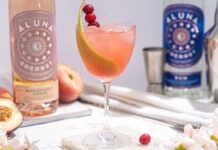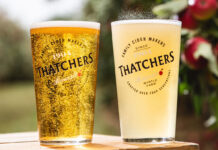Soft drinks firms say consumers are seeking out premium serves
THERE’S no sign the gin bubble is going to burst any time soon, with small producers from Scotland and abroad continuing to roll out premium liquid after premium liquid, driving interest in the category.
And it’s not just gin sales that are on the up.

Fergus Franks reckons customers want “better quality” serves.
Tonic waters and mixers are seeing the benefit of a burgeoning gin category, according to a number of soft drinks firms.
Ruaridh Aitken, assistant brand manager at Fentimans, said the “explosion” in premium and craft gins “has had a knock-on impact on the mixer market” as drinkers seek out “a premium product with superior taste” to complement the spirit.
“To satisfy the growing need of craft mixers, pub and bar operators are well-advised to ensure they have a selection of premium mixers on offer,” said Aitken.
Nathan Burrough of the recently-relaunched historic Scottish soft drinks brand Bon Accord agreed that the rise of gin has led to greater interest in mixers amongst on-trade customers.


The potential to boost sales through premium mixers was also raised by Fergus Franks, on-trade manager at Fever-Tree.
Franks reckons on-trade customers are seeking out a “better quality drinking experience” as drinking habits change.
“Consumers are drinking less, but opting for better quality when they do – 17% of UK consumers expect to reduce alcohol consumption over the next five years, versus 5% looking to increase,” said Franks.
To capitalise on this trend, Franks suggested flavoured tonic waters as a “fantastic way for operators to switch up and refresh their G&T offering”.
“We have single-handedly pioneered the flavoured tonic market, in line with the continued growth of consumer interest in gin,” he said.
“We now have a strong portfolio of six tonics – Indian Tonic Water, Naturally Light Tonic Water, Aromatic Tonic Water, Mediterranean Tonic Water, Elderflower Tonic Water and Sicilian Lemon Tonic – creating an interesting match for the four main flavour profiles of gin.”
Franks also highlighted the important role garnish can play and suggested operators pay close attention to the spirits and mixers they use alongside different fruits and herbs.
“Garnish plays a huge part in one’s drinking experience, especially with the delicate botanicals used in the craft gins on the market,” said Franks.
“Keeping the serves simple and elegant with a garnish that is chosen to highlight the flavours in the drink provides a huge array of options – simply adding grated chocolate or a sprig of rosemary will completely change a drink.”
Licensees can develop the knowledge of their staff so they can identify up-selling opportunities.
Justin Horsman, marketing controller at Franklin & Sons, agreed on the importance of garnishes, which he said can “both harmonise with a gin’s key flavours, or contrast and balance them”.
“For example, some gins include no citrus botanicals during distillation, in anticipation of being served with an orange or lemon garnish,” said Horsman.
With more gins available to bartenders now than ever before, Horsman reckons the choice of garnish and mixer can “make or break your gin and tonic”, making these choices key.
Aitken at Fentimans agreed, arguing that staff knowledge is important for any outlet looking to improve their bottom line.
“To maximise sales of gin the licensee can develop the knowledge of their staff so they can identify cross and up-selling opportunities,” he said.
Aitken also suggested operators expand their gin offer by hosting tasting events and classes, “building up a sense of being a licensee that can specialise in gin along with other beverages and spirits on offer”.
Looking to the future, Aitken is optimistic that tonics and mixers will continue to thrive as the nation’s gin producers go from strength to strength.
“Having worked in the small-batch Scottish spirits industry I can attest to the creative innovation and commitment of Scottish craft producers,” he said.
“We work with a number of them and are always impressed in how they are engaging with consumers and licensees, and we look forward to working with this exciting group in the future.”

























